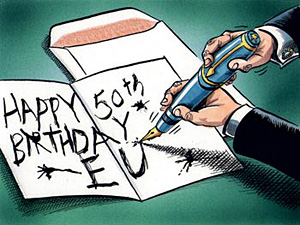 |
 |
 |
 Editorials | March 2007 Editorials | March 2007  
Europe No Longer Makes People Dream
 Jean-Marcel Bouguereau - Le Nouvel Observateur Jean-Marcel Bouguereau - Le Nouvel Observateur


| | The European Union is fifty. |
While it's getting ready to celebrate the fiftieth anniversary of the Treaty of Rome in Berlin, Europe no longer makes people dream. It's as though a drive had broken. And yet, the very fact that the ceremonies are taking place in Berlin is highly symbolic.

Not long ago, over half the member states were dictatorships. Their adoption of democracy was concurrent with their adhesion to the European Union.

From one end to the other of the European continent, people live much better and are freer than half a century ago. If someone had told the ten signatories to the Treaty of Rome that the Europe of 2007 would look the way it does today, he probably would have been considered crazy. In spite of corruption, unemployment and outsourcing, progress is real.

A currency has been created; capital, people, goods and services circulate - almost - freely; the Old Continent has been reunified; the terrible divisions of the 1990s over the Balkans have opened up into a still-inadequate, but real, foreign policy and 27 countries are peopled by over 490 million people agreeing to be regulated by the same laws. But this progress produces a paradox: individually, most Europeans live better than before, but collectively they are gnawed by doubt. Their doubts are partly a consequence of Europe's success and rapid enlargement.

It is not simple to project oneself beyond the short term and to get past rejection reflexes to envisage the future of an enlarged Europe.

New paradox: the French, nearly 55 percent of whom rejected the proposed European Constitution, mostly (71 percent) claim to be very proud to be European. But their main concern is to hope for a more protective Europe, more careful to defend a social project they deem threatened - a sentiment that was broadly responsible for the Left's "no."

Consequently, France's isolation persists, even though the adversaries of the Constitution recognize that it is urgent to at least agree on a form of interior regulation to avoid paralysis now that the six have become 27.

Meanwhile, as they prepare for the Berlin summit, member states have bickered over the way to resume the institutional debate, even though Chancellor Angela Merkel has whistled the end of recess by taking up the pen herself: a treaty must be adopted by June 2009.

Jean-Marcel Bouguereau is editor-in-chief of Le Nouvel Observateur. He is also an editorialist at the Rèpublique des Pyrënèes, for which this article was written. | 
 | |
 |



